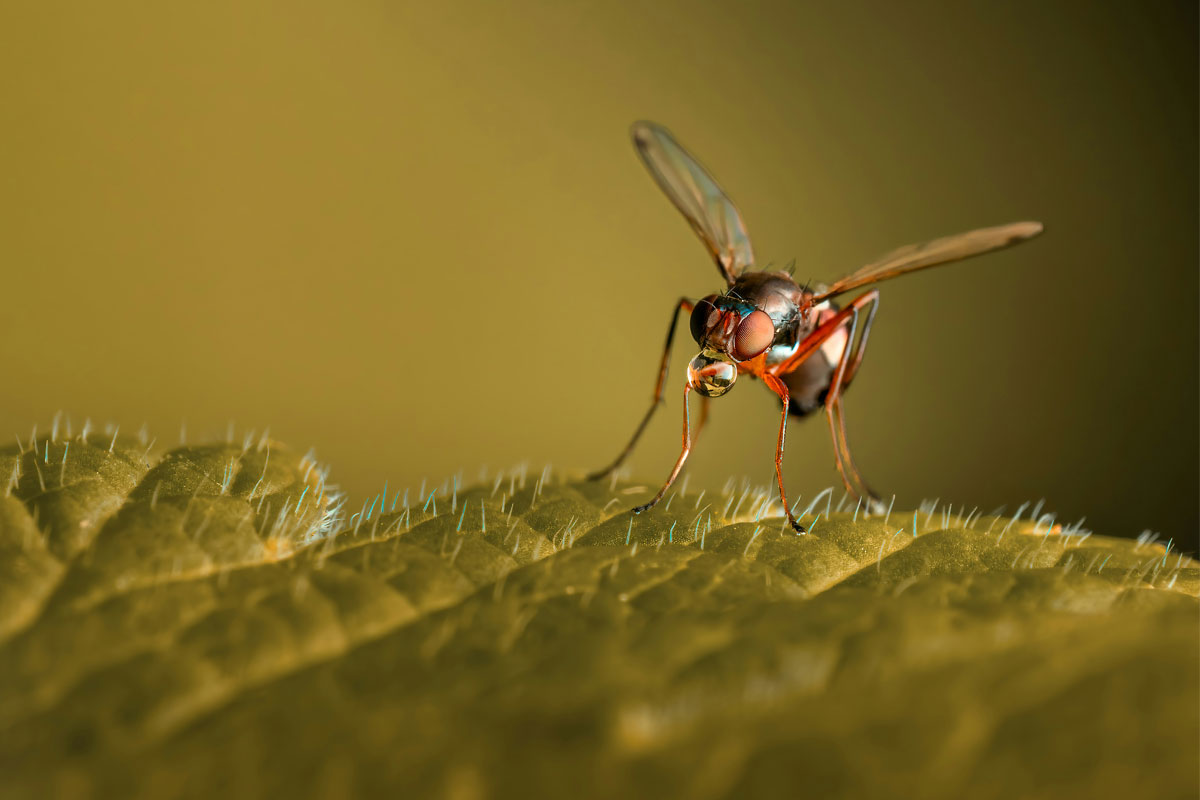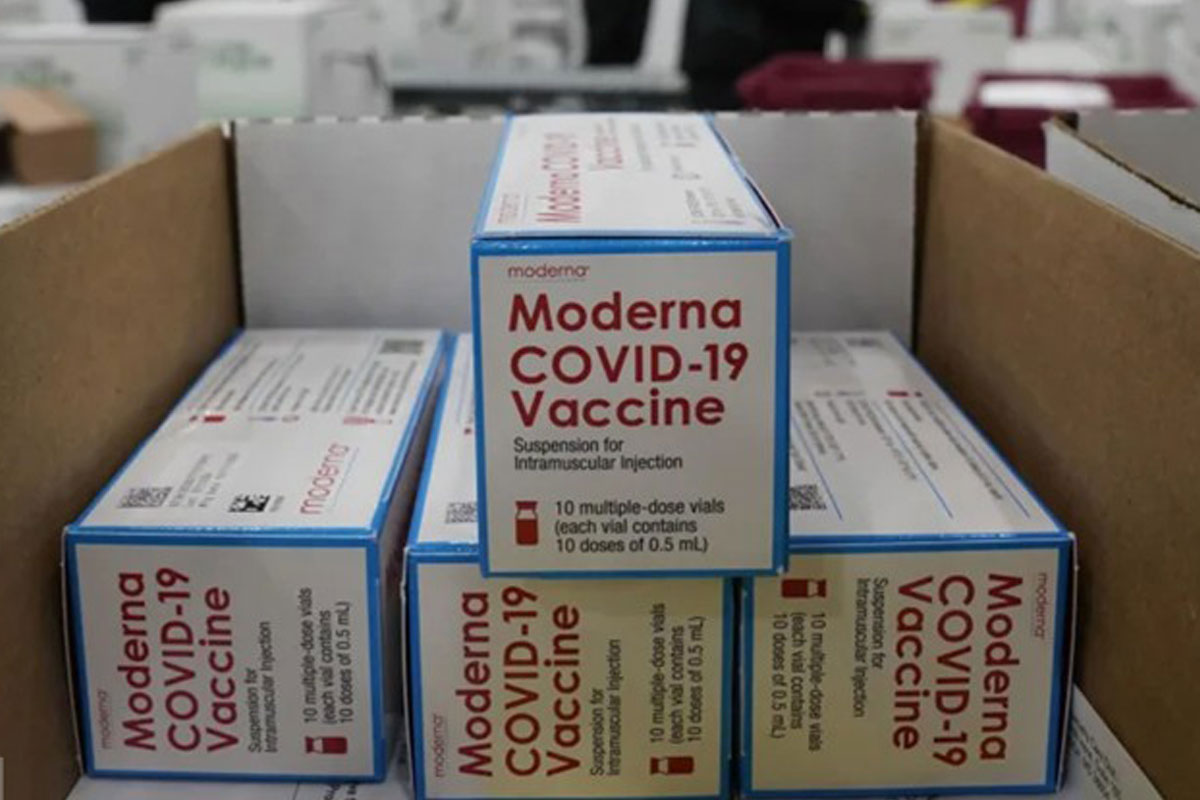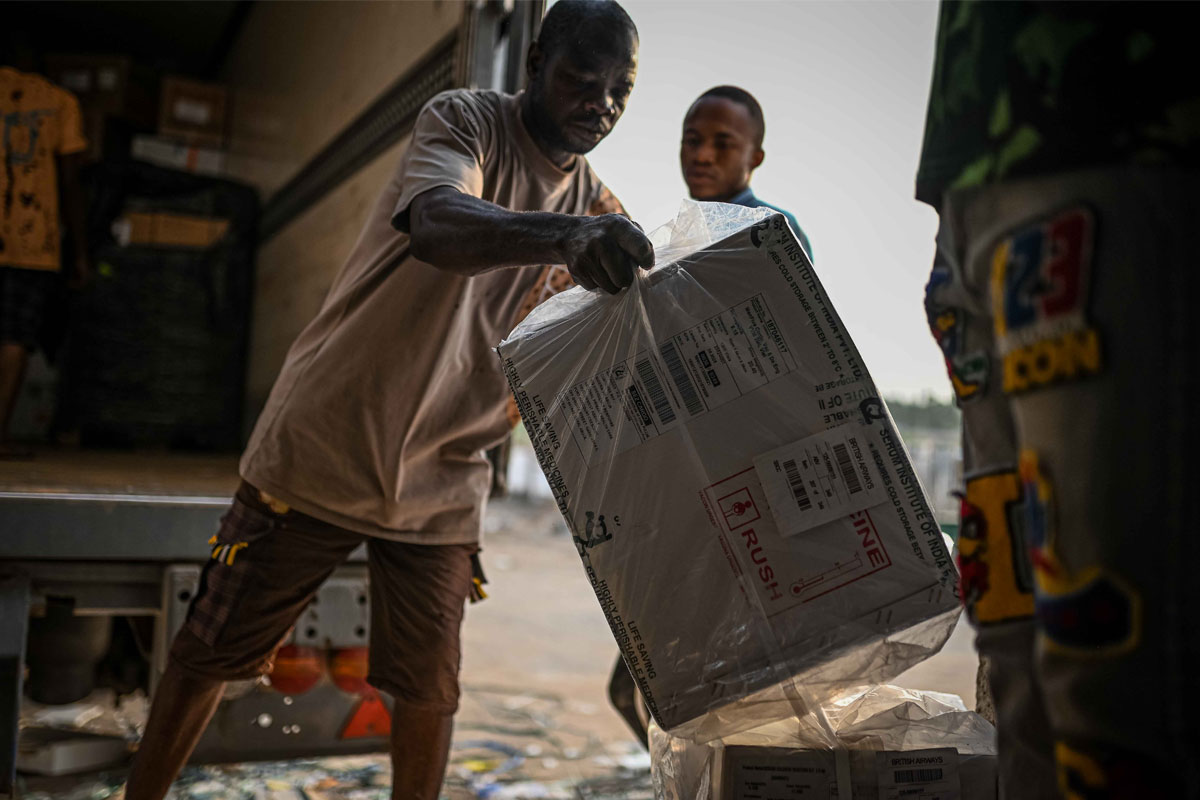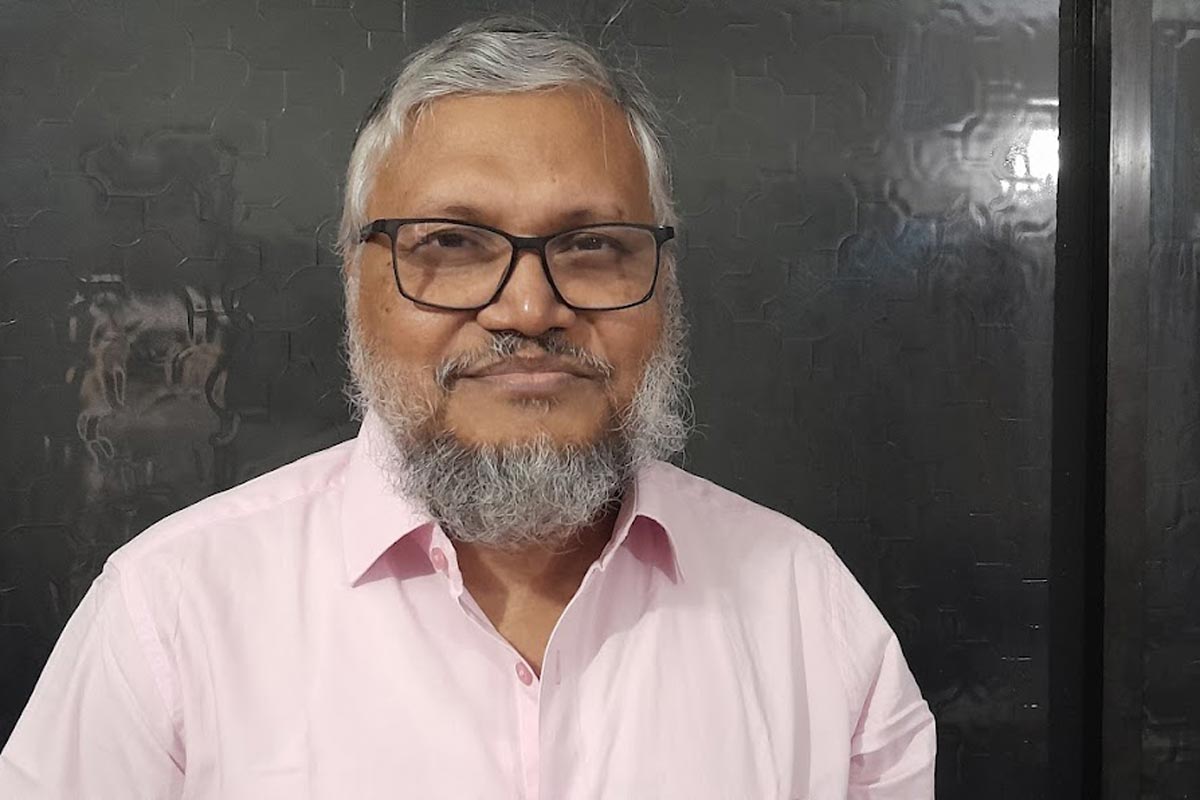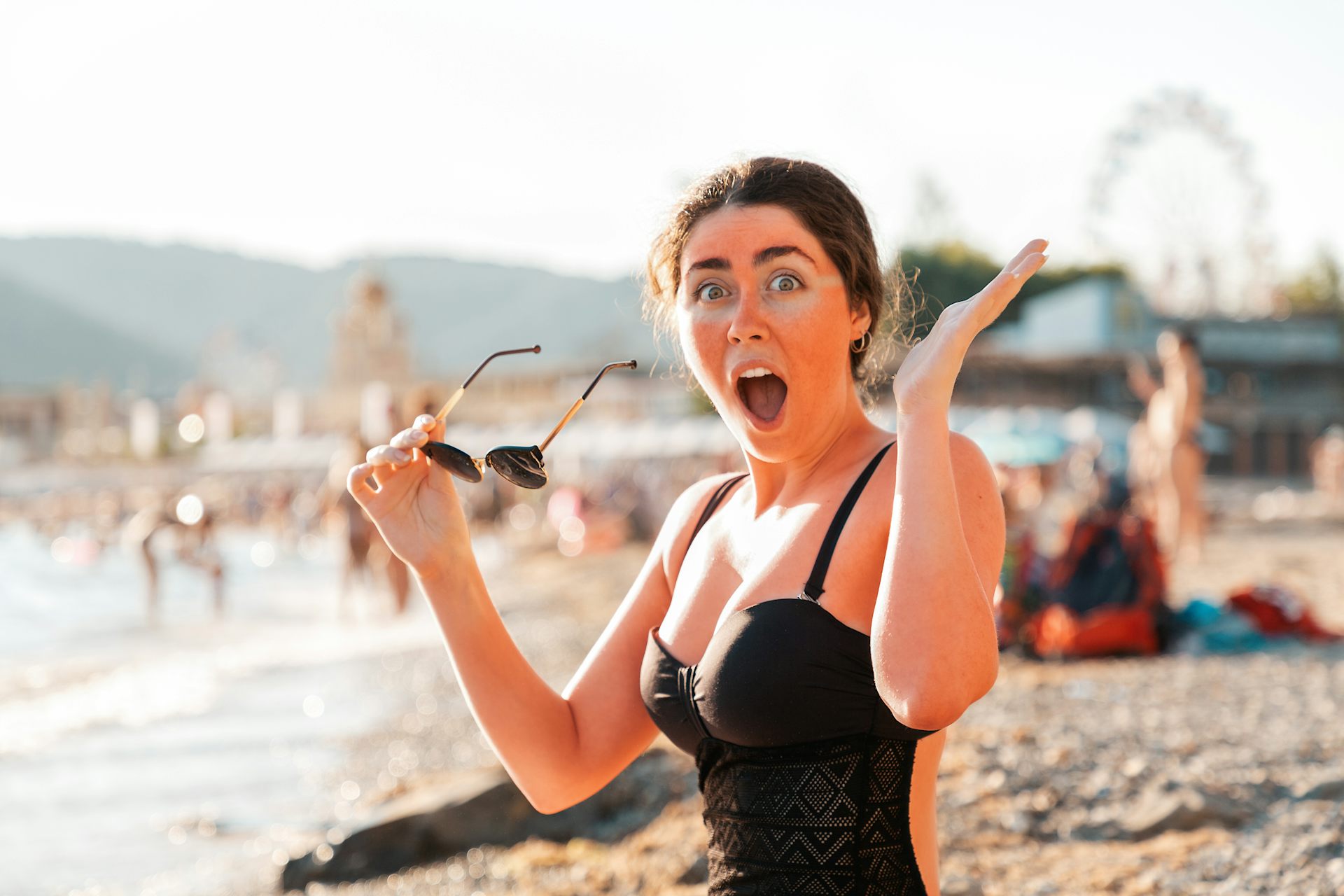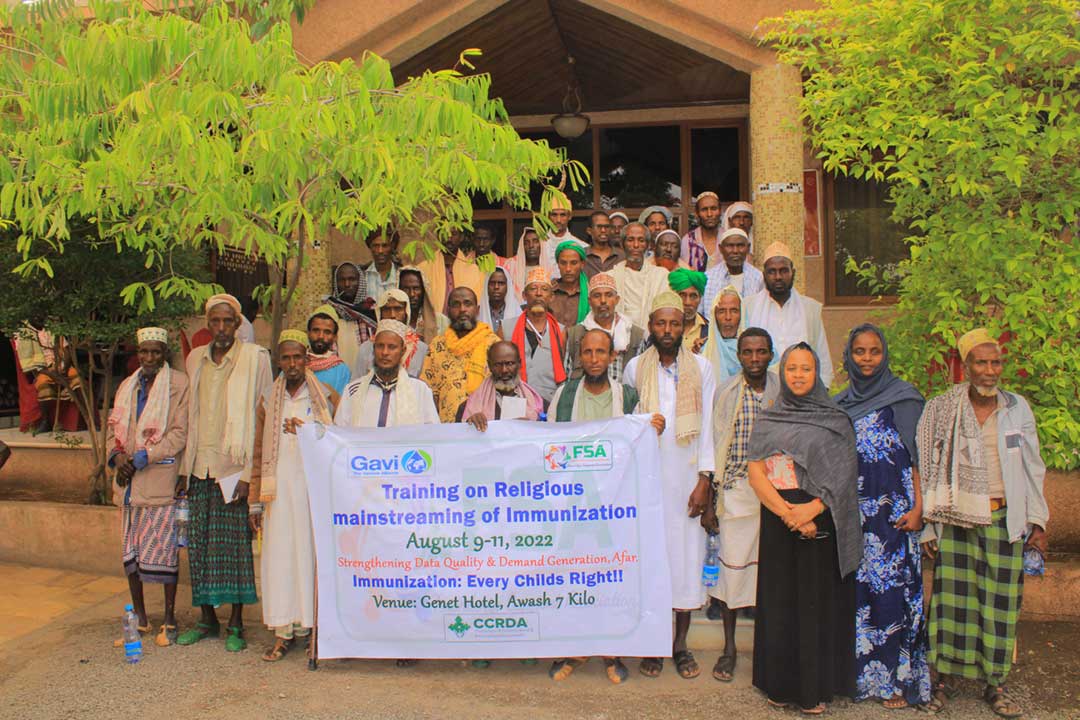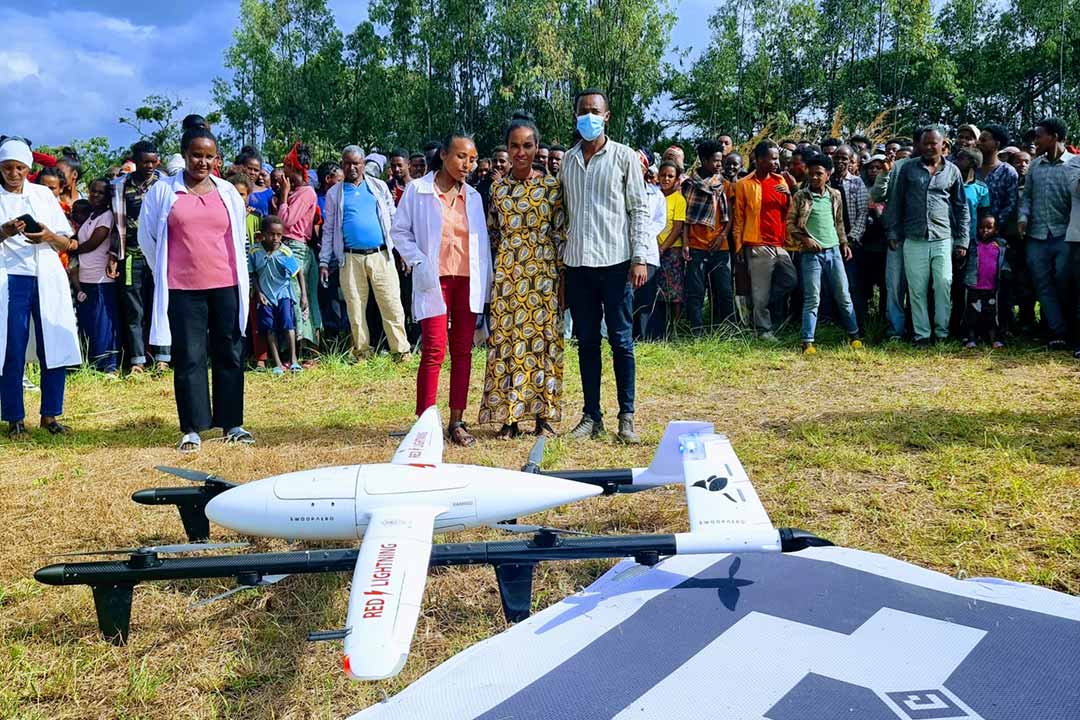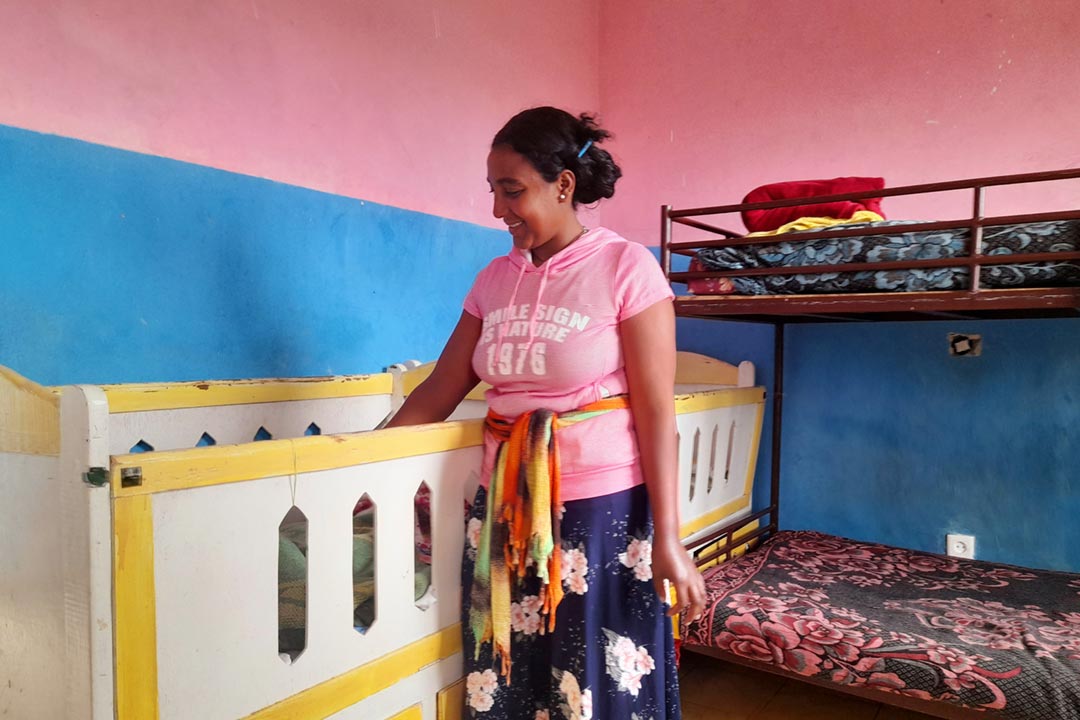After measles, a life in the dark
Not so long ago, measles was the leading cause of childhood blindness in poor countries. Vaccination and vitamin A supplementation helped – but now measles cases are again on the rise. In Ethiopia, VaccinesWork spoke to sightless survivors.
- 8 April 2024
- 11 min read
- by Solomon Yimer , Maya Prabhu
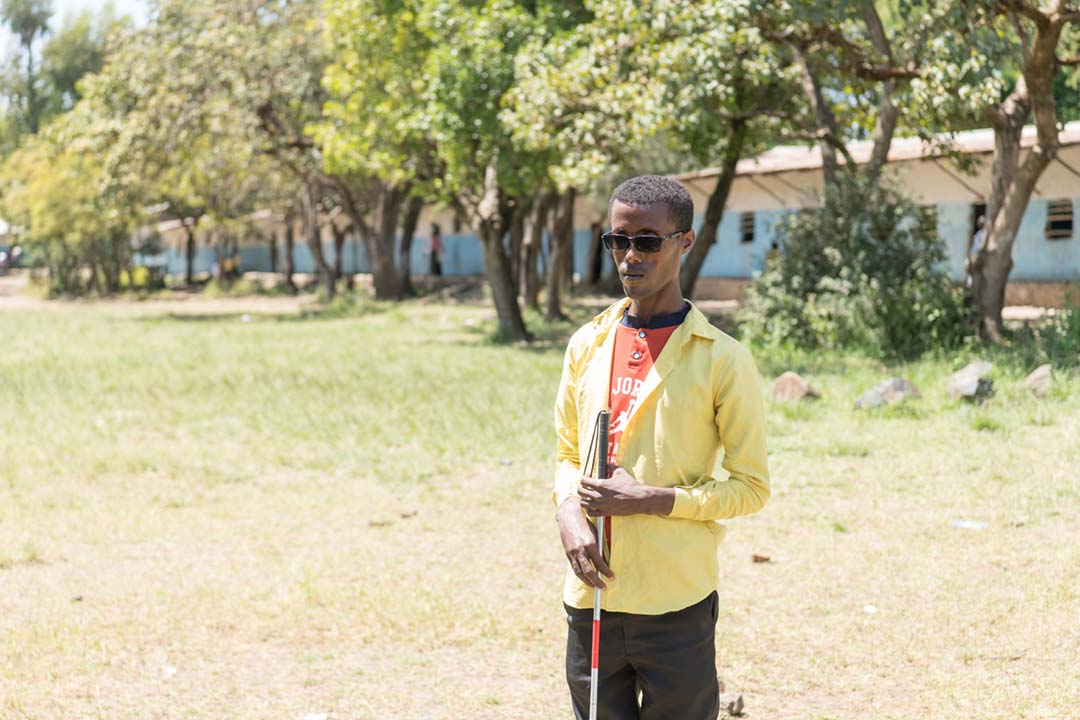
Thirty years ago, an outbreak of measles hit a small farming village on the outskirts of Gondar town, in Ethiopia's Amhara region. Locals say many children fell ill. Guade Demeke, then aged twelve, and his brother, aged eight, were among them.
Demeke's little brother died. Demeke survived.
Neither of them recovered.
"A real horror"
Demeke is in his forties now – tall, tranquil in manner, prone to cracking an understated joke and a mild smile. He wears dark glasses and moves with the aid of a white cane. He lives in Gondar, but we met him in Addis Ababa, where he happened to be for a meeting. His wife was at his side to help him navigate the unfamiliar streets of the capital.
"People, certainly in the west, have forgotten what a terribly, terribly serious disease [measles] is."
– Professor Clare Gilbert, ophthalmologist, London School of Hygiene and Tropical Medicine (LSHTM)
"It was a real horror," he said, remembering the year he lost his eyesight. "Childhood is a playful period. I was enjoying that with my friends – but suddenly I lost my brother and became blind, and stayed at home. That changed my whole life. I got really depressed and traumatised."
Demeke had spent three months in hospital fighting the infection. He emerged to a lightless world he describes as "changed to hell". He wouldn't dare to walk unsupported for another six months.
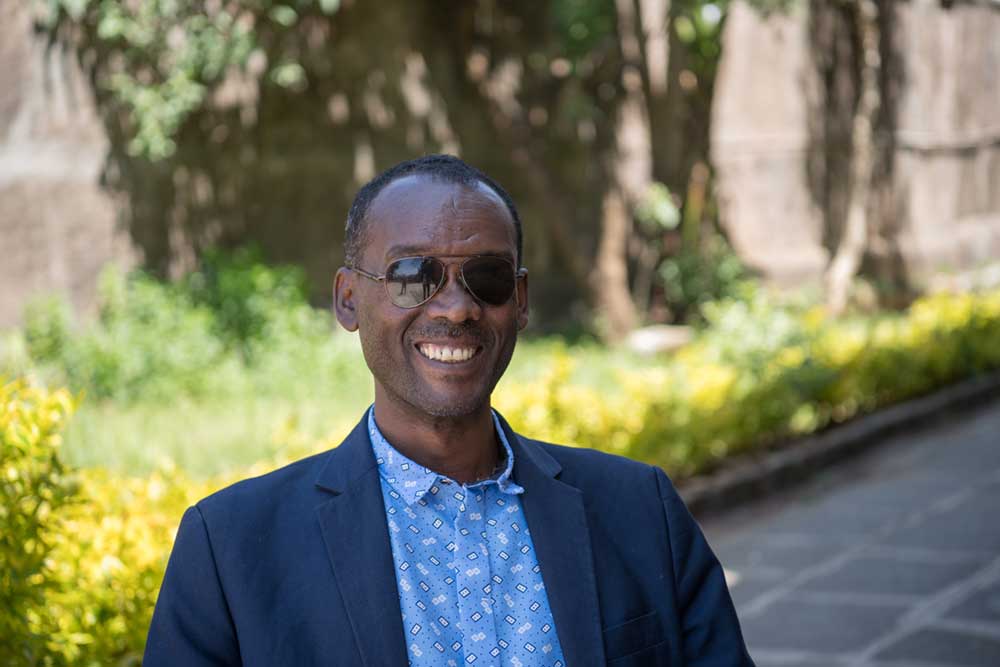
Credit: Gavi/2022/Maheder Haileselassie
"I thought I was turned from a normal person to a living dead. I didn't have a choice to live or die, and finally I didn't have any choice – and after some time left with no choice, I did accept, and tried to cope with it," Demeke said.
Lights out
As recently as two decades ago, measles was understood to be the single leading cause of blindness in children in low-income countries, causing as many as 60,000 children to lose their vision annually. Vaccination, improved vitamin A supplementation and better health education have brought those rates down in years since, but particularly in poor and remote settings, a measles outbreak still brings with it the risk that children will suffer preventable blindness.
In Ethiopia, that remains a significant public health concern, according to Dr Mulusew Asferaw, a consultant paediatric ophthalmologist in Addis Ababa. "The number of children who are blind from measles is common in our set-up, particularly for those that are coming from rural areas, where lack of access to health care as well as immunisation is very low."
In a 2017 BMJ Global Health paper co-authored by Dr Asferaw, researchers determined that measles and vitamin A deficiency – which often mount a combined attack on the cornea of the eye – were "still the leading causes" for loss of sight in vision-impaired students at a school for the blind in northwest Ethiopia.
After COVID-19 disrupted immunisation programmes worldwide, measles outbreaks have become more frequent, with measles fatalities jumping 43% in 2022. Under conditions like these, confirmed Dr Asferaw, there's reasonable cause for concern that in some places, more kids may be going blind, too.
"It's really worried me, that because of this disrupted health care system as a result of the COVID pandemic, there could be higher prevalence of measles outbreaks, leading to complications resulting in blindness in children," he said.
"The cornea just melts"
"The cornea is normally this highly structured, very thin, highly transparent structure at the front of the eye," said Professor Clare Gilbert, an ophthalmologist who specialises in eye health in low- and middle-income countries at the London School of Hygiene and Tropical Medicine (LSHTM), and a co-author with Dr Asferaw of the BMJ Global Health paper.
But measles can precipitate a number of processes that cause the cornea to degrade or lose transparency, with resultant loss of vision, she explained.
The measles virus affects all epithelial tissues: the skin (think of the tell-tale measles rash), the lining of the gut, respiratory tract, bladder, brain, brain, and eyes. Conjunctivitis occurs in nearly all measles patients, and in most cases resolves completely, without lasting damage.
But under assault from the virus, the epithelium of the cornea can ulcerate, said Dr Gilbert. "And without that protective layer, it is just much more vulnerable to infection by bacteria," she continued. "If the ulcer becomes infected, it is likely to heal with a scar." Scars cause opacity, obstructing vision.
Measles can also tank a child's reserves of vitamin A, which is critical for health, including corneal health.
That can occur via few different mechanisms simultaneously. Fever accelerates the body's metabolic rate, meaning children with measles need a higher level of dietary vitamin A than usual. Fever can also make children lose appetite, and local feeding customs can mean that sick children are given bland food to eat, which is low in vitamin A.
At the same time, because measles attacks the immune system, opportunistic herpes simplex infections frequently set in around the lips, making eating painful, again compromising adequate intake of vitamin A-rich foods.
Meantime, measles in the gut lining might cause a protein-losing enteropathy, which can result in malabsorption of vitamin A, and infection of the lining of the bladder can cause the body to shed proteins that are need to carry vitamin A in the blood into the urine. All of that places recovery at risk: when the worst of the illness is over, the body will need vitamin A in order to help all the affected epithelial tissues heal.
"The greater demand for vitamin A, coupled with lower intake and loss in the urine can build up to a perfect storm," said Dr Gilbert. Children from poor families, particularly those living in areas with seasonally low availability of dietary vitamin A, start from a vulnerable baseline: measles can easily tip them into disaster.
"If a child becomes acutely, severely [vitamin A] deficient, the cornea can just melt," she said. "The cornea just goes to a mush really, and that means they can lose the contents of the eye. The lens can come out, the iris can come out of the eye, and that is a complete catastrophe." Two-thirds of children who undergo this process, called keratomalacia, will die within a few months if not given high-dose vitamin A, she added.
And though measles-linked blindness is avoidable, making of every case a system error, there are cases that are doubly tragic – where misguided, non-scientific home remedies backfire.
Have you read?
Parents of children with painful eyes, which are uncomfortably sensitive to the light, want to make them better. If those parents have limited health education and poor access to health services, they might use traditional remedies. "It might be expressed breast milk, or chicken's blood. It might be holy water, or it might be something more harmful like ground up cowrie shells or twigs, infusions, leaves. All sorts of things are used as traditional remedies, including urine," said Dr Gilbert. "I've seen a child, not following measles, but following ordinary conjunctivitis, who was bilaterally blind because she'd used her uncle's urine, who obviously had gonorrhoea."
Dr Asferaw said that, in all, some 80% of the cases of blindness he and his colleagues found in Ethiopian schools for the blind were preventable – either because the condition itself was preventable, or because proper care was not accessed. Measles in particular, he went on, "is a preventable disease. One: we prevent measles by increasing access for measles immunisation. Two: we can prevent [blindness and death] by high-dose vitamin A supplementation. In addition, we can prevent corneal blindness by improving nutrition and improving sanitation in the life. Finally, family members need to take their child for urgent treatment."
(Un)dimmed futures
For the vast majority of kids in lower-income countries, surviving blind means confronting a drastically curtailed future. Dr Gilbert described meeting a blind child in a village, who was so under-stimulated that she had developed compulsive behaviours, ceaselessly rocking back and forth.
Fewer than 10% of children with visual impairments in lower-income countries have access to education, according to the World Blind Union, and as of 2007, a staggering 98% of disabled children in rural Ethiopia were left out of schools.
Demeke, too, was told he would not return to school after he lost his eyesight. "The community was not aware that a blind kid can learn, and my parents were not willing to send me to school, fearing I would get physically hurt," he said.
He stayed home for two years, before learning through his church of a Catholic boarding school for the blind in his region. He applied.
For Demeke, admission to St Raphael was the lucky break most children in his position never receive. Soon, he was fluent in reading and writing braille. Eventually, he received a law degree, and now works as the head of the Gondar chapter of the Ethiopian National Association for the Blind, where he advocates for better access to education and the workplace for people with vision deficits.
"Nowadays things are changing a bit, as people see our education success," Demeke said. "Parents who have blind children show an interest in sending their kids to school."
In October 2022, in Gondar, VaccinesWork met visually-impaired student Minale Jenge Shibabaw, then aged 19. Like Demeke, he lost his sight to a measles epidemic that swept his village in Amhara when he was seven. "Many unvaccinated children were affected by the outbreak, and some others lost their vision too," Jenge said.
Like Demeke, Jenge was out of school for years after he went blind. Then a doctor at Felege Hiwot Referral Hospital in Bahir Dar urged Jenge's parents to send him to school.
They listened – but as in most low-income countries, disability-adapted schooling wasn't easy to find. NGO Sightsavers notes that children, especially girls, with disabilities are less likely to be learning even if they are in school, due to materials and curricula that aren't adapted to their needs.
So Jenge's parents took him hundreds of kilometres away to Azezo, a town just south of Gondar, to St Raphael, the same residential school Demeke had attended.
Our reporters visited the campus, a peaceful, strikingly well-built compound fringed with small trees. Children, all under the age of 15 and all visually impaired, chattered and played in quiet clusters in the schoolyard. Sixty-five students live at the school, but only the children in the first to fourth grades are educated on campus. The remainder attend government-run schools in the area, to ease the potentially fraught transition to life "on the outside".
"With no doubt, my life completely changed," said Jenge. "When I lost my vision I was traumatised, and told I couldn't achieve anything in life." The school's administration and his teachers helped him to a new perspective, he said. "Now I believe that the blind can do everything in life – I don't mean living with disability doesn't affect my life, but if you feel you are weak, you will be getting more weaker," he said.
Rationed luck
St Raphael doesn't have space for all the children who seek admission. Mebratu Zekataias, a caregiver at the school, said that of about 20 students who apply for a place each year, St Raphael is only able to admit about five or six. The remainder return to their villages, or seek an education elsewhere.
Abraham Abuhay is 25 years old. Sightless following a childhood bout of measles, he has been pursuing an education at Fasiledes Primary School on Gondar's outskirts for the past eight years, since he moved from his rural village to the town. Fasiledes is a regular public school with thousands of students drawn from the surrounding communities.
In a resource centre dedicated to supporting the needs of the few disabled students at the school, we sat down with Abuhay and a special needs teacher called Tsehay Mekete. "These students are brilliant. What they need is opportunity and support. I want to give the sense of: I can make it. I can build it. I can do it," she said.
Even though Mekete has learned how to make braille textbooks herself, a lack of adequate and well-adapted resources still prevents many blind students completing their educations.
"Over the years I met many measles-blind students who came from the rural areas and attended classes here," said Abuhay. "But most of them dropped out of school due to economic problems and lack of facilities.
"There was a belief that measles was normal"Abuhay only learned that measles was preventable by vaccination – the two-course jab is publicly funded as part of Ethiopia's routine immunisation system – when he started attending Fasiledes.
Jenge's story is a little different: "My mother told me that the vaccination was available at health posts nearby, but my family believed the vaccination would cause negative health consequences for me. That's why I didn't get vaccinated," he said.
Demeke's parents, meanwhile, told him that a belief prevailed in his society that everyone would survive a measles outbreak at one point in their lifetime – that contracting measles was "normal". Vaccination, as such, was not considered an urgent need – and the only hospital in the region wasn't easy to get to.
All three men say they now advocate for vaccination in their home communities. "There was not enough information about the importance of vaccines in the community," said Demeke. "If I got vaccinated for measles I wouldn't have lost my vision."
He said he is comforted that today "everyone understands the importance of vaccines".
Alarmingly, recent data begs to differ. WHO considers 95% immunisation coverage the threshold for herd immunity from measles, one of the world's most contagious viruses. Global immunisation coverage currently stands at a worrying 83%; already in 2024, outbreaks have been reported in countries like the UK and the US – places that long ago boasted control of the disease.
"People, certainly in the west, have forgotten what a terribly, terribly serious disease it is," said Dr Gilbert.
More from Solomon Yimer
Recommended for you
